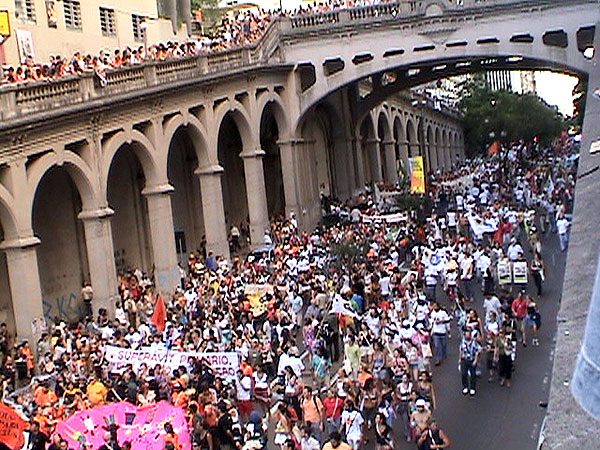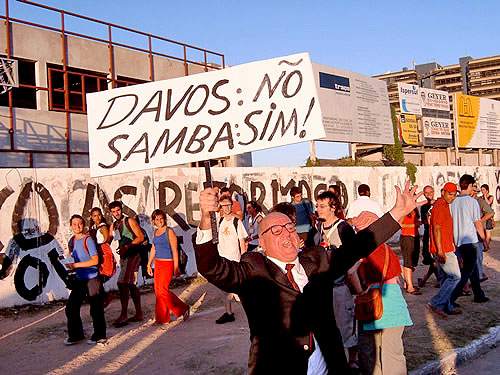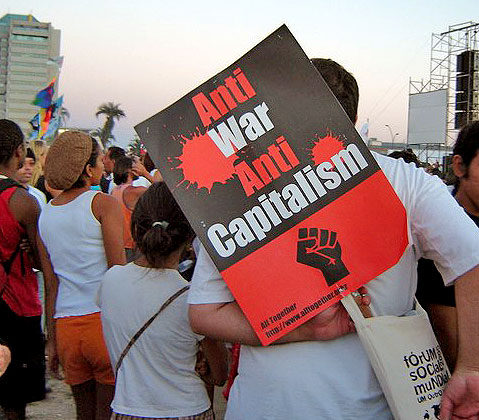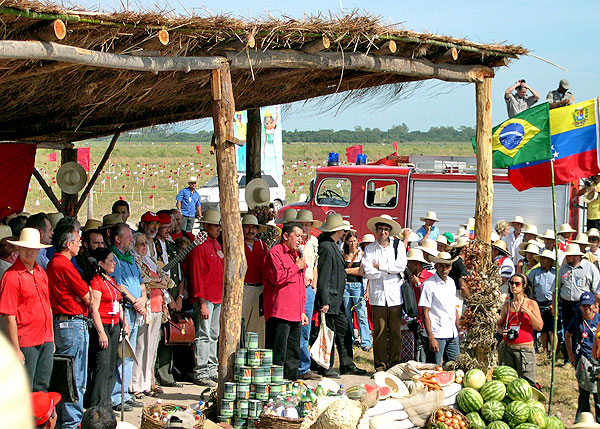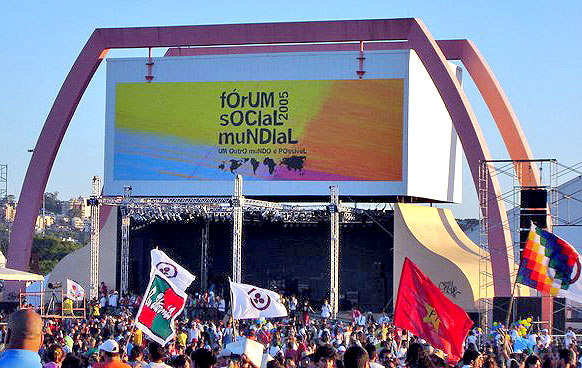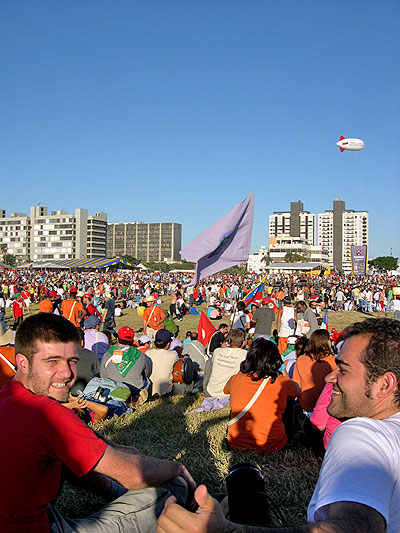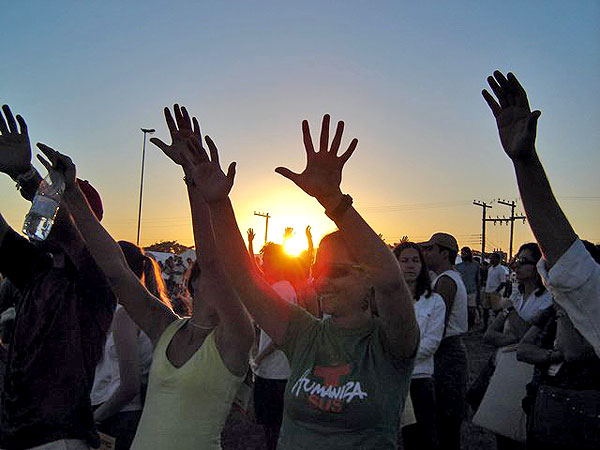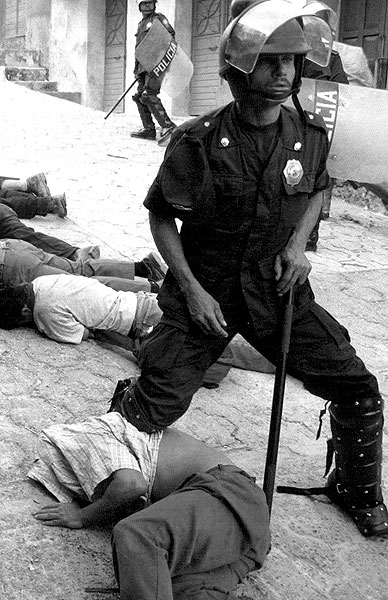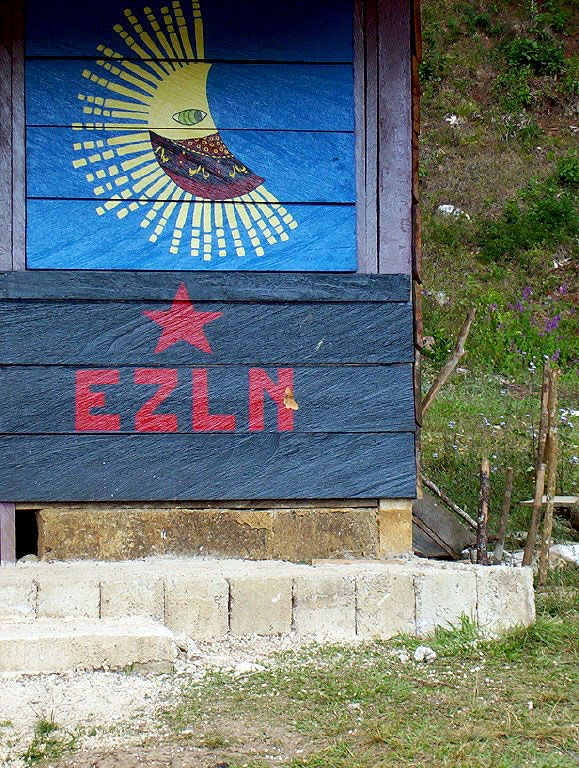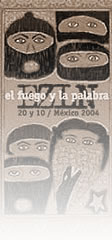
2004
03/01/2005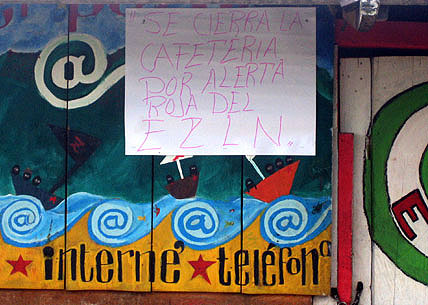
UPDATE: From the Red Alert to the Sixth Declaration of the Lacandon Jungle
29/07/2005The Fifth World Social Forum (WSF) was held last January 26th-31st in Porto Alegre, Brazil. It coincided for the first time with the World Economic Forum (WEF), at which the world’s financial and political leaders gather. The WSF seeks to function as a counterweight to the WEF by being “an open meeting space to…articulate effective actions…that oppose neoliberalism and the domination of the world by capital or any other form of imperialism.” (From the statement of principles of the WSF).
The numbers from Porto Alegre 2005 seem to indicate a great success: more than 150,000 participants came from 135 countries, 6800 journalists attended, there were 2500 activities, 2800 volunteers and 352 final documents produced (for example, (see the “Call of Social Movements Against War, Neoliberalism, Exploitation and Exclusion, for Another World is Possible.”)
The WSF has become a gigantic space that has gone far past the ideas of its creators. Outside of the official Forums (including global, continental, and thematic ones) that have been developing with widespread social participation since 2001, the WSF has also been credited with playing a crucial role in the global protest against the Iraq war which mobilized 10 million people on 4 continents on February 15th, 2003.
Nevertheless, my impressions after living the recent Forum do not entirely coincide with the feelings of the Venezuelan President, Hugo Chávez, who called it “the most important political event in the world.”
A giant carnival?
Upon arriving at the extensive space in which the Forum’s activities were planned, at the shore of the Guaiba river, it was impossible to stop wondering if this was an event intended to give birth to “another possible world” or if it was a trip to the beach. People were, understandably, dressed for the heat of the Brazilian summer, the ambiance was relaxed and the place smelled of suntan lotion. It was also easy to wonder whether the people would be in the nearly 500 tents of different sizes which would host the “official” activities or whether the “real action” would be in the streets.
In Porto Alegre, it is frowned upon to sympathize with the Brazilian President, Lula da Silva, as he is strongly questioned by the majority of the Brazilian population present at the WSF. Nevertheless, I agree somewhat with his description of the WSF: “an ideological fair.” In fact, in the “hallways” of the gathering, many people question the format and the validity of the meeting. Others referred to the risks it faces. For example, Paul Nichols from Vía Campesina argued that the WSF “should not be a forum for tourism but a space of social struggles against neoliberalism”. The Portuguese winner of the Nobel Prize for Literature, José Saramago, mentioned the risk of the Forum becoming a simple “Mecca for leftist pilgrimages and discussions about utopias”. James Petras said, “The Forum has no political content; it is just a big happening, where the world gets together and each person talks about her own causes, but which lacks any coherence or expression.” Personally, not even during the massive march did I feel the power of a militant committment or of a real construction. Rather, I found a search for answers to questions of all kinds, from the individual to the social. In other words, I felt what Benedetti calls “such a well-attended solitude.”
The WSF faces its own contradictions
According to some, the WSF could certainly fall victim to its own success. Its giant size and the diversity of agendas and interests represented at it make it difficult to focus. Also, there are opposing forces within the Forum that could end up fracturing it.
Elitism vs. social participation
It is obvious that it is difficult for the representatives of social movements to go on such an expensive trip. In many respects, including the election of Porto Alegre, a “developed” city according to the North’s criteria, the Forum is designed in large part by and for the First World. The idea of decentralizing the Forum has been proposed: in 2007, the Forum should be held in an African country. But for the moment, apart from the massive Brazilian presence, the majority of the rest of the participants came from the North or had their participation costs covered by organizations from the North.
Another level in which there is a certain amount of elitism, is in the space given to the best-known public figures and personalities. This is not only the responsibility of the organizers, but also of the participants. It seems that we have more capacity for listening when we value the speaker more.
Pragmatism v. utopia
Two main factions can be seen within the Forum. The first believes that the WSF is not practical or concrete, but rather that it is an opportunity to move from criticism and discussion to solutions and actions. To combat the Forum’s tendency toward atomization, they suggest selecting a few points of focus for the struggle.
The other group maintains that the Forum should be a horizontal space for dialogue and articulation, and that it should be free from discrimination and heirarchy. This group believes that to set priorities for the Forum contradicts its own spirit, which is reflected in the Letter of Principles that defines the WSF as “an open meeting space” which “does not claim to be representative of global civil society.”
Obviously there are differences between those who arrive for the first time and those who have attended in other years and now want to move to another level. An example of this is the “Porto Alegre Manifesto. Twelve proposals for another possible world”, signed by various personalities (although they recognize that they do not speak for the Forum). I thought of the saying of the Zapatistas from Chiapas: “walk at the pace of the slowest one.”
Similarly, there is also a tension between reformist attitudes (respecting state structures) and the options of struggle that propose a total system transformation.
The risk of cooptation
Another risk that has been pointed out, and from which the WSF has never been completely able to avoid, is cooptation by political actors.
Those most radical question how much it has become a space for catharsis that helps to avoid direct confrontation with the capitalist system. To make the comparison with Carnaval, as it is celebrated in my town (albeit with less sequins and rhythm as in Rio): one day a year, people can make fun of each other, and especially of the authorities, with impunity. But the next day, everything goes back to normal.
A final point of concern is the almost systematic absense of any real debate. Almost all of the events follow a panel format, followed by “debate between all of the participants.” Many times this second part becomes a conversation where neither side listens. Whatever the topic of the event, often, each participant insists on returning to his own cause that brought them to the Forum.
And yet, there is much to save…
Greater convergence
First, the event was moved from the elitist Catholic University of Porto Alegre to outdoor spaces, where 205 auditoriums and 295 tents were erected, in large part with recycled or natural materials. The pollution of the river was striking in comparison. This effort toward greater convergence that embodies the changes that the Forum proposes to the rest of the world is also evident in other details like the backpacks for the participants, the toilets, the food stands, etc, all of which followed the logic of economic solidarity.
There were also organizational and methodological changes aimed at developing a more bottom-up process. All of the activities were suggested by the participants and none were imposed by the organizers, unlike before when the latter would make the decisions about the main conferences, their topics, and their speakers.
Multiple encounters
Within this Babel, the possibility for encounters appears infinite: North-South, South-North, North-North, South-South, South in the North and North in the South. Another language is reinvented. Out of necessity, and in a way that is rare for people in their home country, they make a sincere effort to communicate. Discussion, theorizing, effeciency in producing agreements or concrete products is not everything; there are also the formal and informal meetings of so many people. Each person’s contribution and the convergence of so many paths in one place should not be devalued. A huge range of searches and meanings are found in the wide-ranging program. It is difficult to find any kind of social transformation that is missing. There is no other space where this degree of diversity can be seen. The WSF is not “a” Forum, but rather many Forums at once.
Seeds of hope?
The richness of the WSF lies precisely in its diversity. The way to fight against a hegemonic model is through fostering diversity, not by substituting one dominant model for another. Jorge Santiago, from the Chiapan NGO DESMI (Economic and Social Development of Mexican Indigenous), who was also at Porto Alegre, told us later that the WSF “is like a huge present, which will probably include a lot of wasted paper. Also, remember the Biblical parable of the weeds. Seeds of change are being sown. They will not produce 150,000 fruits, and not all of them will become agents of change. But nonetheless, a new element can come from there. In any case, the world is not going to change there, in Brazil, but rather wherever you are. It is an invitation to keep on working where you are, from your own place of struggle.” I fully agree with him: time to get to work!

